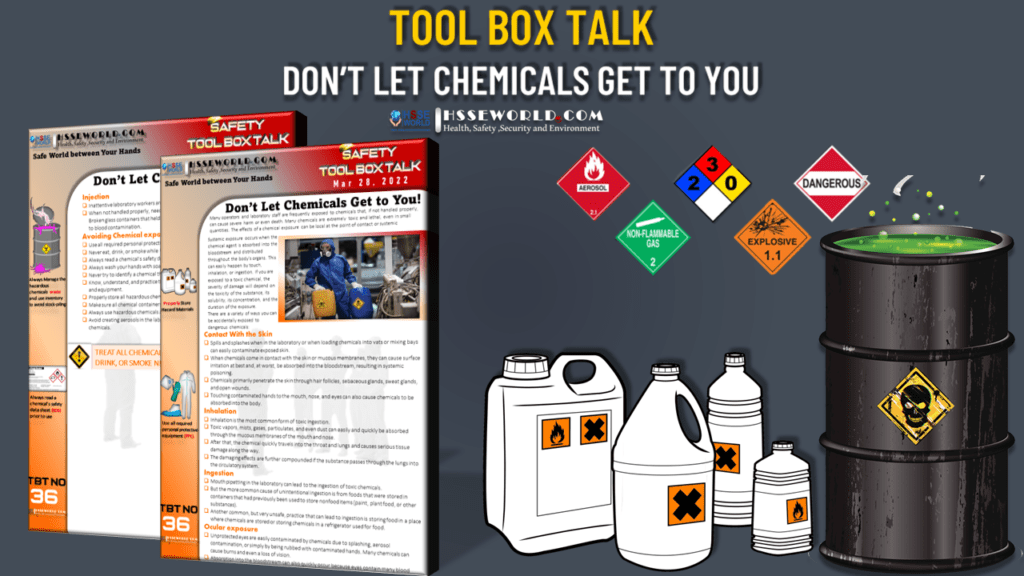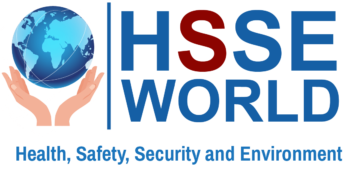Tool Box Talk: Don’t Let Chemicals Get to You
4 min readMany operators and laboratory staff are frequently exposed to chemicals that, if not handled properly, can cause severe harm or even death. Many chemicals are extremely toxic and lethal, even in small quantities. The effects of chemical exposure can be local at the point of contact or systemic.
Systemic exposure occurs when the chemical agent is absorbed into the bloodstream and distributed throughout the body’s organs. This can easily happen by touch, inhalation, or ingestion. If you are exposed to a toxic chemical, the severity of damage will depend on the toxicity of the substance, its solubility, its concentration, and the duration of the exposure.
In This Tool Box Talk, you will be familiar with the hazards of chemicals Exposure and route of entry to the body, and the safe ways to avoid Chemical exposure.
(Read More: E-Books: NIOSH Pocket guide to chemical hazards )


There are a variety of ways you can be accidentally exposed to dangerous chemicals:
Contact With the Skin
Spills and splashes when in the laboratory or when loading chemicals into vats or mixing bays can easily contaminate exposed skin. When chemicals come in contact with the skin or mucous membranes, they can cause surface irritation at best and, at worst, be absorbed into the bloodstream, resulting in systemic poisoning.
Chemicals primarily penetrate the skin through hair follicles, sebaceous glands, sweat glands, and open wounds. Touching contaminated hands to the mouth, nose, and eyes can also cause chemicals to be absorbed into the body.
Inhalation
Inhalation is the most common form of toxic ingestion. Toxic vapors, mists, gases, particulates, and even dust can easily and quickly be absorbed through the mucous membranes of the mouth and nose. After that, the chemical quickly travels into the throat and lungs and causes serious tissue damage along the way. The damaging effects are further compounded if the substance passes through the lungs into the circulatory system.
E-Books: Food Safety Management-A Practical Guide for the Food Industry
Ingestion
Mouth pipetting in the laboratory can lead to the ingestion of toxic chemicals. But the more common cause of unintentional ingestion is from foods that were stored in containers that had previously been used to store non-food items (paint, plant food, or other substances). Another common, but very unsafe, practice that can lead to ingestion is storing food in a place where chemicals are stored—or storing chemicals in a refrigerator used for food.
Ocular exposure
Unprotected eyes are easily contaminated by chemicals due to splashing, aerosol contamination, or simply by being rubbed with contaminated hands. Many chemicals can cause burns and even a loss of vision. Absorption into the bloodstream can also quickly occur because the eyes contain many blood vessels.
Injection
Inattentive laboratory workers are particularly susceptible to needle accidents.
When not handled properly, needles can easily and quickly inject chemicals into the body. Broken glass containers that held toxic chemicals can also cut the skin and expose a worker to blood contamination.
( Read more: How to Prevent Needlestick Injuries )
Avoiding Chemical exposure
- Use all required personal protective equipment (PPE).
- Never eat, drink, or smoke while handling hazardous chemicals.
- Always read a chemical’s material safety data sheet (MSDS) prior to use.
- Always wash your hands with soap and hot water after using chemicals.
- Never try to identify a chemical through smell or taste.
- Know, understand, and practice emergency evacuation and containment procedures and equipment.
- Properly store all hazardous chemicals.
- Make sure all chemical containers are correctly labeled.
- Always use hazardous chemicals as intended.
- Avoid creating aerosols in the laboratory: do not use open vessels for processing chemicals.
Laboratory Inspection Checklist Form(Opens in a new browser tab)




TREAT ALL CHEMICALS WITH RESPECT AND NEVER EAT DRINK OR SMOKE NEAR CHEMICALS.
Download Don’t Let Chemicals Get to You
More Toolbox Talks
- Death of Oregon forestry worker prompts new toolbox talk
- Tool Box Talk: Securing a construction Site
- Tool Box Talk: Basic Electrical
- Tool Box Talk: Hazardous Chemicals- Four Routes of Entry
- Tool Box Talk: Excavation
- Tool Box Talk: Shift Work Dangers
- Tool Box Talk: Hearing Protection
- Tool Box Talk: Hydraulic Excavators: Lifting with Slings
- Tool Box Talk: Pneumatic tools
- Tool Box Talk: Oil Spill Response
- Tool Box Talk: Heart Risks: AEDs and CPR in the Workplace
- Tool Box Talk: Aerial Lift Safety
- Tool Box Talk: Aerogel Nanoporous Insulation Products
- Tool Box Talk: Arc Welding and Fire Safety
- Tool Box Talk: Asphalt Fumes: Roofing Operations
- Tool Box Talk: Biohazard Safety
- Tool Box Talk: Boom Truck Safety
- Tool Box Talk: Carbon Monoxide Poisoning
- Tool Box Talk: Rotary Hammers-Hammer Drills
- Tool Box Talk: Working Around Heavy Equipment
- Tool Box Talk: Winter Driving Safety Tips
- Tool Box Talk: Lockout and Tagging
- Tool Box Talk: Hand Grinder Safety
- Tool Box Talk: Don’t Let Chemicals Get to You
- Tool Box Talk: Rough Terrain Fork Truck Scaffolds



